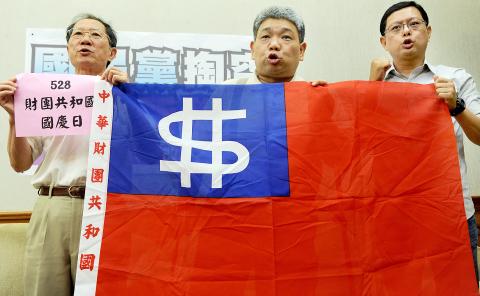The Alliance for Fair Tax Reform yesterday criticized the Chinese Nationalist Party (KMT) caucus’ draft bill for a capital gains tax on securities transactions, saying it completely lacked the “ability-to-pay” principle.
The KMT version provided more evidence that President Ma Ying-jeou (馬英九) may fail to keep his campaign promise to pursue a fairer tax system and social justice, the alliance said.
“The proposal by the KMT caucus has been the ‘worst version’ among all current drafts,” alliance convener Wang Jung-chang (王榮璋) told a press conference.

Photo: Chu Pei-hsiung, Taipei Times
His comments came a day after Minister of Finance Christina Liu (劉憶如) tendered her resignation to show her unhappiness with the KMT lawmakers’ tax proposal.
Wang said no other countries in the world impose a capital gains tax on securities transactions with a link to the benchmark index.
Under the KMT’s proposal, corporations would be taxed under the Alternative Minimum Tax (AMT) rule, while individual investors would be able to choose one of two options at the beginning of the year — to include stock gains as part of their annual income, or to pay more securities transactions taxes when the TAIEX is higher than 8,500 points.
Fluctuations in the index are unrelated to investors’ gains or losses, Wang said, adding that people may still make profit from stock investments even when the TAIEX moves below the 8,500 mark.
The KMT’s proposal is little more than a slight increase in the securities transaction tax, not a plan to tax capital gains, he said.
Neither the KMT nor Democratic Progressive Party (DPP) has showed much determination to launch tax reform, the alliance said.
“We have not yet seen the DPP play an important role in the tax reforme,” Wang said.
Chien Hsi-chieh, convener of the Anti-Poverty Alliance, agreed.
“The KMT proposal would be a big victory for the rich and business groups with vested interests,” Chien said.
Taiwan Labor Front secretary-general Son Yu-lian (孫友聯) warned of a backlash from salaried workers if the Ma administration continues to promote what he described as a “fake capital gains tax.”
Meanwhile, Taiwan Semiconductor Manufacturing Co (TSMC, 台積電) chairman Morris Chang (張忠謀) yesterday lambasted the government for what he said was a hasty decision to impose a capital gains tax and the timing of the move.
Chang also said he strongly opposed the Ministry of Finance’s tax proposal, approved by the Cabinet last month, to raise the minimum corporate income tax from 10 percent to 12 percent.
The corporate income tax hike is part of the ministry’s draft to resume a capital gains tax.
The government should make a separate proposal to hike minimum corporate income tax, Chang told reporters.
“We do not trade stocks [to make profits]. We have nothing to do with the capital gains tax,” he said.
TSMC would have to pay an additional NT$3 billion (US$101.8 million) in tax next year based on the ministry’s tax proposal, he said.
Additional reporting by Lisa Wang

Intel Corp chief executive officer Lip-Bu Tan (陳立武) is expected to meet with Taiwanese suppliers next month in conjunction with the opening of the Computex Taipei trade show, supply chain sources said on Monday. The visit, the first for Tan to Taiwan since assuming his new post last month, would be aimed at enhancing Intel’s ties with suppliers in Taiwan as he attempts to help turn around the struggling US chipmaker, the sources said. Tan is to hold a banquet to celebrate Intel’s 40-year presence in Taiwan before Computex opens on May 20 and invite dozens of Taiwanese suppliers to exchange views

Application-specific integrated circuit designer Faraday Technology Corp (智原) yesterday said that although revenue this quarter would decline 30 percent from last quarter, it retained its full-year forecast of revenue growth of 100 percent. The company attributed the quarterly drop to a slowdown in customers’ production of chips using Faraday’s advanced packaging technology. The company is still confident about its revenue growth this year, given its strong “design-win” — or the projects it won to help customers design their chips, Faraday president Steve Wang (王國雍) told an online earnings conference. “The design-win this year is better than we expected. We believe we will win

Chizuko Kimura has become the first female sushi chef in the world to win a Michelin star, fulfilling a promise she made to her dying husband to continue his legacy. The 54-year-old Japanese chef regained the Michelin star her late husband, Shunei Kimura, won three years ago for their Sushi Shunei restaurant in Paris. For Shunei Kimura, the star was a dream come true. However, the joy was short-lived. He died from cancer just three months later in June 2022. He was 65. The following year, the restaurant in the heart of Montmartre lost its star rating. Chizuko Kimura insisted that the new star is still down

While China’s leaders use their economic and political might to fight US President Donald Trump’s trade war “to the end,” its army of social media soldiers are embarking on a more humorous campaign online. Trump’s tariff blitz has seen Washington and Beijing impose eye-watering duties on imports from the other, fanning a standoff between the economic superpowers that has sparked global recession fears and sent markets into a tailspin. Trump says his policy is a response to years of being “ripped off” by other countries and aims to bring manufacturing to the US, forcing companies to employ US workers. However, China’s online warriors